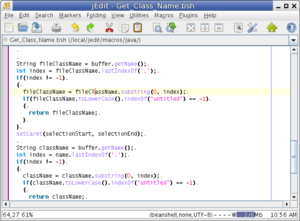jEdit
 jEdit 4.3 showing Java macro. | |
| Original author(s) | Slava Pestov |
|---|---|
| Developer(s) | jEdit project |
| Initial release | 1998 |
| Stable release | 4.3
/ December 23, 2009 |
| Preview release | -
/ - |
| Repository | |
| Written in | Java |
| Operating system | Java-supporting [1] |
| Available in | English only |
| Type | Text editor |
| License | GPLv2 |
| Website | http://www.jedit.org |
jEdit is a text editor for programmers, available under the GNU General Public License version 2.0.
Compatibility
jEdit is written in Java and runs on Linux, Mac OS X, OS/2, Unix, VMS, and Windows.
Development
jEdit development was started in 1998.
The founding author was Slava Pestov, who left the project in 2006, handing development to the free software community.[2]
Features
jEdit includes Syntax highlighting that provides native support for over 130 file formats. Support for additional formats can be added manually using XML files. It supports UTF-8 and many other encodings.
It has extensive code folding and text folding capabilities as well as text wrapping that takes indents into account.
The application is highly customizable and can be extended with macros written in BeanShell, Jython, JavaScript and some other scripting languages.
Plug-ins
There are over 150 available jEdit plug-ins for many different application areas.
Plug-ins are used to customize the application for individual use and can make it into an advanced XML/HTML editor, or an integrated development environment (IDE), with compiler, code completion, context-sensitive help, debugging, visual differentiation and language-specific tools.
The plug-ins are downloaded via an integrated plug-in manager which finds and installs them and their associated updates automatically. [3]
Some available plug-ins include:
- Spell checker using Aspell
- Text auto-complete
- Accents plugin that converts character abbreviations for accented characters as they are typed.
- XML plugin that is used for editing XML, HTML, JavaScript and CSS files. In the case of XML, the plug-in does validation. For XML, HTML and CSS, it uses auto-completion popups for elements, attributes and entities.[4]
Reception
In general jEdit has received positive reviews from software writers.
Rob Griffiths wrote in April 2002 for MAC OS X HINTS saying he was "very impressed" and naming it "pick of the week". He cited its file memory upon reopening, its ability to notice if an open file was changed on disk by another program, syntax coloring, including that users can create their own colour schemes, split windows feature, show line number feature, convertible tabs to soft-tabs and view sidebars. He also praised its customization possibilities using the extensive preferences panel and the "on the fly" search engine, which searches while typing.[5]
Griffiths noted that the application has a few drawbacks, such as that it is "a bit slow at scrolling a line at a time" and that because it is a Java application it doesn't have the full Aqua interface.[5]
Scott Beatty reviewing jEdit on SitePoint particularly noted the application's folding feature along with its search and replace and PHP syntax highlighting capabilities. He recommended the use of the PHPParser plug-in. The PHPParser is a PHP parser that checks for PHP syntax errors whenever a PHP code file is loaded or saved. He noted that downloading jEdit is simple, but that getting and installing the plug-ins to customize it for individual use can be a complex process: "Beware that a full setup requires a series of downloads, and that this process can take time."[6]
See also
References
- ^ jEdit (October 4, 2007). "Operating Systems and Java Versions". Retrieved 2007-10-04.
- ^ Slava Pestov. "Slava Pestov's retro HTML 1.0 home page". Retrieved 2009-01-24.
- ^ jEdit (October 1, 2007). "jEdit Features". Retrieved 2007-10-01.
- ^ jEdit (October 1, 2007). "jEdit Plug-ins". Retrieved 2007-10-01.
- ^ a b Rob Griffiths (April 29, 2002). "Review: jEdit programming text editor". Retrieved 2007-10-01.
- ^ Scott Beatty (February 8, 2005). "Use jEdit to Edit Your PHP". SitePoint. Retrieved 2007-10-01.
